Every morning, Dad would get up early to buy fish fillets and potatoes at the market warehouses in
My mother stayed at home to cook, wash and clean, like all Greek ladies of her time. By 10 o’clock, she had prepared the evening meal and done most of the daily household chores. Then she did something that practically no other Greek woman of her time did: she took her bag and keys, locked the house and drove her own car to the shop. She was one of the few Greek immigrant women driving in
Mum’s job was to pre-cook all the fried bits and pieces that were sold along with the chips. First, a light batter would be made up and allowed to rise. Then she’d take the fish pieces, dredge them in flour, dip them in the batter and toss them into one of the two vats filled with lard that were used for this purpose. Dad took care of the third vat, pre-cooking chips in huge rectangular metal baskets. Everything would be drained well, then laid out on paper-lined drawers below the counter, and allowed to cool down before they were re-cooked in the customers’ orders.
In the early afternoon, Dad would come to pick us up from school. We were in our mid-teens before we were allowed to take the bus by ourselves. To get to the bus stop, we had to walk past the Parliament buildings, probably the most policed area of the whole of the city. It took a while for our parents to realize that the chances of being raped or kidnapped at half-past three in the afternoon after school when the streets of
I’d take up my position by one of the deep freezers that we had in the work space behind the counter, while the little laughing olive tree took up her position by the second freezer. We’d open our school bags, spread out our books and start doing our homework, as fast as we could before the 6 o’clock teatime customers started arriving. I earned my linguistics major on that freezer. That’s where all my term papers were written. When the shop got busy, we’d leave our textbooks, notebooks and pencil cases to come out to the front of the shop and take the customers’ orders while Mum and Dad did the greasy cooking. When we needed something from the deep freezers, we’d pile our books one on top of the other, hold on to them tightly, open the freezer and get what we wanted. When things started to quieten down on the front, after seven o’clock, we’d go back to our homework. Kiwis all wanted to eat a the same time, or so it seemed to us. The rush over, Mum and Dad would clean up and get ready to close down by 8pm – unless it was late night shopping night, and we’d close at 9pm. The last customers were the drinkers from the pub at the shopping centre. They’d come in just before we closed down, reeking of alcohol, with their friends of the opposite sex, laughing rather raucously, as though they had just left from a Christmas party. They were the most talkative customers, the ones my parents were most afraid of.
When we came home, we weren’t so much exhausted, as smelly, greasy and rattled. We reeked of fish and lard. We ate our meal late, had a bath, finished off our homework and laid out our school uniforms clean and ready for the next day. Then we went to bed. There wasn’t much else that could be fitted into the evening. This was what most days of the year were like for us. This is what I thought life in
View Larger Map
She would have asked me to stop – as I did – so that she could go into the church, make the sign of the cross and light a candle.
Then she would have taken her grandchildren into the church to do the same. She’d probably have washed her hands and face at the fountain with the cool running water and walked around the cave telling the children that everyone has a guardian angel looking out for them.
She probably wouldn’t have wanted to walk down the underpass just next to the cave, which leads to the coolest bluest lagoon I've ever seen, the perfect place for a secluded swim away from the crowds; it's not the right kind of place for sufferers of osteoporosis.
She would probably have rested on one of the stone benches outside the church in the cool damp air of the cave, away from the harsh bright sunlight and the high levels of humidity, which would probably have done her more good anyway.
As we drive by the Kasteli shipyards, she might have looked out at the fishermen's boats and told to the children to watch out for pirates.
“We’re having fish today!” she would announce as we seat ourselves at the taverna, with probably a hint of irony in her voice as memories of the fish and chip shop would flood back to us.
"And no alcohol for you because you're driving!" she would add, and I would agree with her.
We’d talk about it as if it were yesterday that we were serving our regular customers in the shop – you never forget those ones: the lady whose cat had an amputated leg, the old man who always said 'woo-o-oo' at the end of every sentence, the widower who would always cry when he mentioned his late wife – and wonder what all the friends and relatives we left behind are doing now in Aotearoa.
After we eat our meal, she’d ask for the bill. I’d offer to pay, and she’d say, “No dear, let me get it this time.” And I’d say, “OK, thanks, mama,” just like I did today.
©All Rights Reserved/Organically cooked. No part of this blog may be reproduced and/or copied by any means without prior consent from Maria Verivaki.
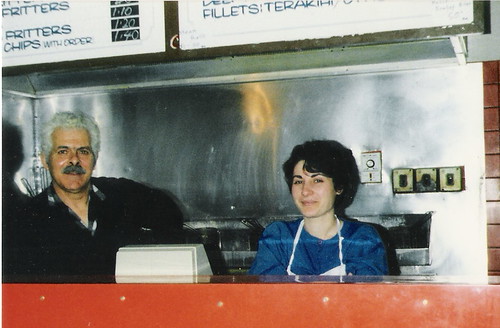
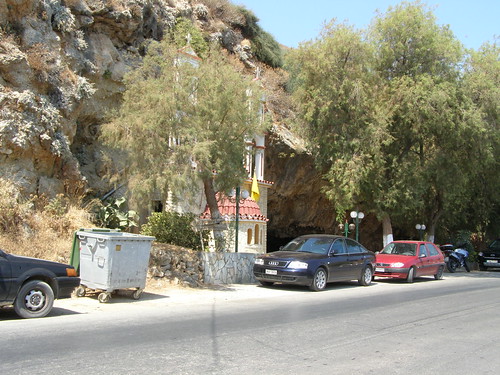
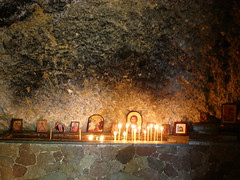
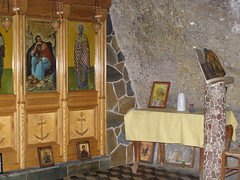
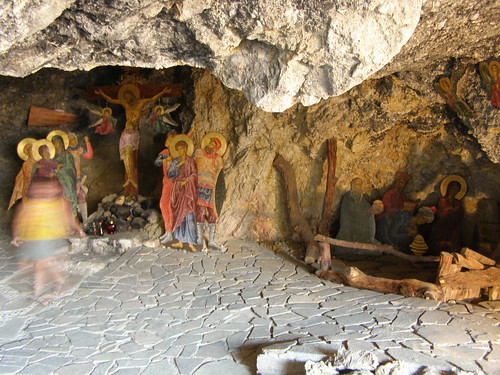

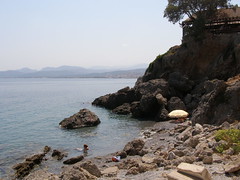

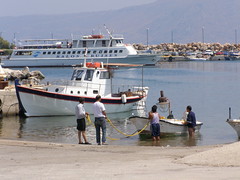
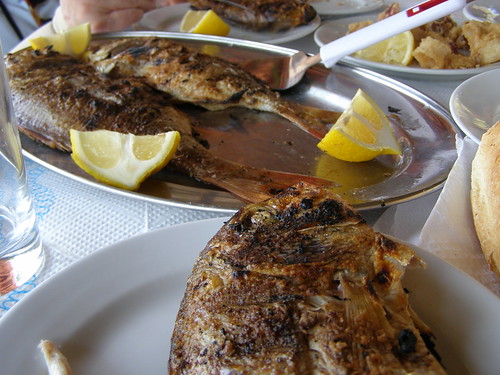
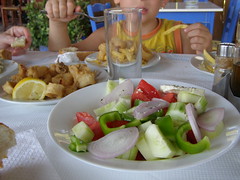

Very nice, well-written story. It's always nice when you have a day that you know exactly what your mom would have done with you.
ReplyDeleteAs for the past? My past isn't like that, really, but my parents were poor, and I spent many childhood evenings at the factory where my dad worked and later borrowed money to buy ownership in. I grew up working there when they needed extra help and writing my term papers there. So different, but really the same.
Really lovely. One of your best. I was right there with you - first at the shop and then at the church.
ReplyDeleteI loved the story about your parents and the fish and chip shop. I will be back to read more, as I really enjoyed your writing.
ReplyDeleteAs for Sanibel Island; yes I do live here and it is like being on a vacation everyday. I love it here. As you said, it is very strange that our paths crossed right after someone talked to you about Sanibel. One of those things that makes you go...Hmmm and shake your head. :-) So now, I will read your stories and you can read mine. That way we can have a little of both worlds so far apart.
Oh wow...I'm in love with the family story. That was awesome and so well told!
ReplyDelete-DTW
www.everydaycookin.blogspot.com
I was once a teal clad girl and we all knew the best fish and chip shops in Wellington were run by Greek families. Thanks for the trip down memory lane...and reminding me of beautiful Hania which I visited far too long ago!
ReplyDeleteYour beautiful story has inspired me to get a big feed of fish and chips and paua patties tonight :D
ReplyDeleteOnce again...wonderful!
ReplyDeleteLoved your story. It is always a great read to hear about your family.We would drive miles to get fish and chips wrapped in newspaper where I grew up. Sadly most of the fish placs are gone so it is harder to get good fish and chips or you just have to go further. We are lucky here in BC to have at least 3 very good shops so I treat myself once in a while:D
ReplyDeleteThanks for nodding me here - My sister and her husband ran a fish-and-chip for many years - previously he'd been a milkman.
ReplyDeleteYour story also reminds me of when we visited NZ in 2001 how taken aback we were that the chippies closed so early like 8pm. In the UK many do not open until 5pm and close around 11pm or midnight. A big part of their trade is after 10pm when people start leaving the pubs.
Your Mom and Dad would be proud of you to tell their story in such a beautiful way. And I think they were very brave to start a business in a foreign country as they did. Great blog!
ReplyDeleteI've been gone for a few days, and am getting caught up on all of your posts. This was a most lovely story, an amazing tribute to your parents perseverance! Your parents sound like they had such an amazing work ethic, and how cool that your mom was one of the first women drivers! You have such a gift for writing and story telling.When you were describing moving your books and balancing them while lifting the freezer, it was as if I was right there. Lovely post!
ReplyDeleteYour stories have been an inspiration to myself and my husband. Con my husband came to Australia when he was 1 with his parents from Greece - he has for the past 10 years wanted to open a fish and chip shop and i think your story has convinced me to give it a go. If your parents could do it with limited english then surely we can too. Thankyou
ReplyDelete